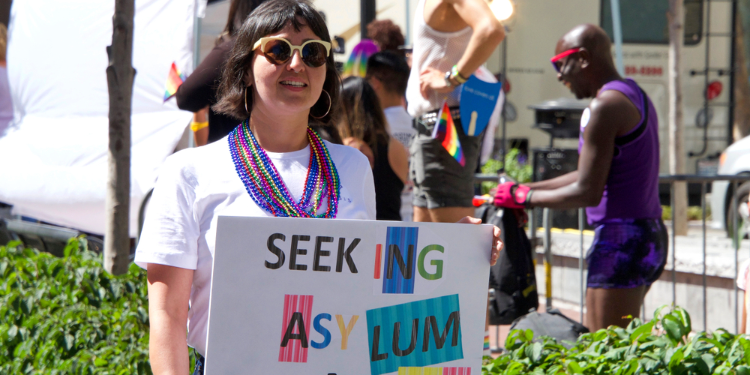
Increasing violence against LGBTQI+ individuals, criminalization of homosexual relationships, and deprivation of rights. The rise in persecution is forcing more LGBTQI+ people to seek asylum abroad. What are the conditions for obtaining asylum? Let's take a closer look.
Rising anti-LGBTQI+ persecution worldwide
Published on Thursday, May 30, 2024, the report by the International Lesbian, Gay, Bisexual, Trans, and Intersex Association (ILGA World) once again sounds the alarm. Anti-LGBTQI+ persecution is on the rise globally. The association released its report just days before Pride Month (June), highlighting that anti-LGBTQI+ violence persists even in countries hosting Pride festivities. For instance, in Jamaica, where Pride events occur, laws criminalizing homosexuality remain in place. Homosexuality in Jamaica is still a crime punishable by up to 10 years in prison. Other countries also criminalize homosexuality, particularly in Africa (Namibia, Cameroon, Algeria, Egypt, Kenya, Tanzania), the Middle East (Saudi Arabia, Oman), and Central and Southeast Asia (Iran, Sri Lanka, Indonesia).
ILGA World acknowledges progress in rights for lesbians, gays, and trans individuals. In 2023, Mauritius, Singapore, Dominica, and the Cook Islands decriminalized same-sex relationships. Estonia became the first member of the former Soviet bloc to legalize same-sex marriage. Nepal also took this step. In 2024, Greece and Liechtenstein authorized same-sex marriage. Thai lawmakers proposed a bill to legalize same-sex marriage. However, these advancements come alongside increased restrictions: in 2023, Uganda passed one of the world's most repressive anti-LGBTQI+ laws. Russia tightened its anti-LGBTQI+ legislation. In 2024, Iraq strengthened its laws against homosexuality. Anti-LGBTQI+ persecution increased in several countries (+19% in the United States, +15% in Germany, +13% in France, and +38% in Alberta, Canada (from 2019 to 2022)). More LGBTQI+ individuals feel compelled to seek asylum abroad.
Conditions for applying for asylum abroad
Asylum applications are generally categorized as “gender-based persecution” and “persecution based on sexual orientation.” One of the primary conditions, and one of the most challenging, is proving the persecution. For asylum seekers persecuted due to their ethnicity, religion, etc., proving victim status is already tricky, and it's even more complex for victims of anti-LGBTQI+ persecution. Their cases are often classified under “another category” by administrations.
Criteria for reviewing asylum applications
Administrations use specific criteria to review applications. Applicants must prove their sexual orientation, transgender or non-binary identity, the persecution experienced in their home country, and their living conditions there.
These general criteria (each state can set its own) highlight the difficulty for asylum seekers in proving their status. They must recount traumatic episodes, reveal their private lives, and discuss things they have always kept hidden. Immigration services' thorough investigations and questionnaires require detailed accounts of their lifestyles and living conditions.
The fundamental issue remains proof: how to prove that one's gender and/or sexual orientation is the cause of persecution? Asylum-reviewing bodies may demand material evidence. But how to materially prove one's gender or sexual orientation? Another difficulty is the language barrier. While interpreters are available, it remains challenging to defend one's case without knowing the language of the country where the asylum is sought. Administrations acknowledge that interpreters are not always competent. Interviews with asylum seekers help agents form opinions and confirm or change their stance. The evaluation of evidence is at their discretion.
More vulnerable asylum seekers
According to LGBTQI+ associations, LGBTQI+ individuals are among the most vulnerable and marginalized asylum seekers. The difficulty in proving their status is a significant factor. They point out that the 1951 Refugee Convention still does not include LGBTQI+ individuals.
The United States is one of the countries receiving the most asylum applications from LGBTQI+ individuals. The “American Dream” is still alive despite conservative crackdowns with anti-LGBTQI+ laws. However, obstacles are numerous. Beyond long and exhausting procedures, victims face practical complications. Asylum applications must be submitted through an app available in English, Spanish, and Creole. But it's impossible to apply without a smartphone and internet connection. The same problem arises if applicants do not know any of the languages available.
LGBTQI+ asylum seekers struggle to make their voices heard. They consider themselves “a minority within a minority” facing “constant persecution” in their home countries and call for greater recognition from states.
Useful links:
Human Dignity Trust: Map of countries where being LGBT+ is a crime
Jamaica: J-FLAG, LGBT+ advocacy association



















